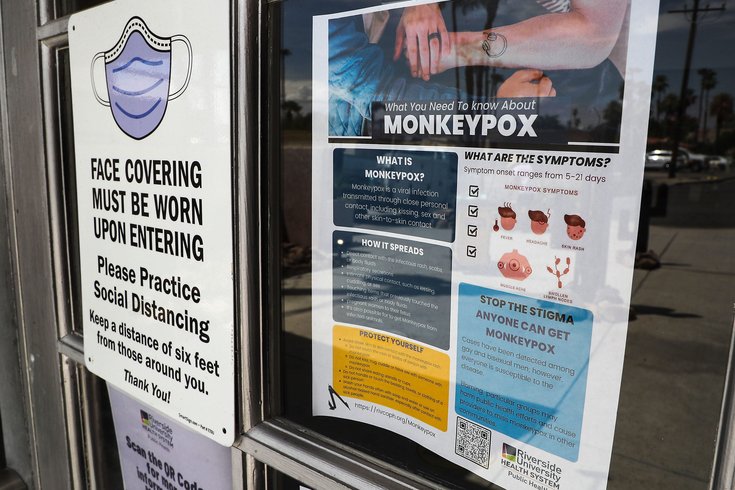
February 21, 2024
 Jay Calderon/The Desert Sun; USA TODAY NETWORK
Jay Calderon/The Desert Sun; USA TODAY NETWORK
Students at Richmond Elementary School in Philadelphia may have had a low-level exposure to mpox, the city's public health department said. This photo show signs hanging on the doors of a resort in Palm Springs, California, in 2022.
Students at a Philadelphia elementary school may have had a low-level exposure to mpox, the city's public health department wrote in a letter to parents and guardians.
The Philadelphia Department of Public Health learned late last week that there was a possible exposure to mpox, formerly known as monkeypox, at Richmond Elementary School in Port Richmond but could not confirm how the exposure occurred, Health Department Spokesman James Garrow said in an email Wednesday.
RELATED: Why you should clean your cell phone regularly – and how to do it
"We learned about this case late last week and promptly issued a letter to ensure that those affected would have information as soon as possible," Garrow said.
"The Health Department does not feel that it is very likely that any of these children will have been exposed to mpox and end up catching it because it has not been shown to spread easily in situations like this (i.e., in a classroom)," Garrow wrote. "That said, the risk is not zero, which is why the Health Department has warned the families of those children. While the risk to those children of exposure is low, there is no risk to others in the school building or the general public."
Mpox is a rare disease caused by viral infection, with early symptoms often appearing as a rash on the hands, feet, chest, face or mouth or near the genitals. Other symptoms can include fever, chills, headache, swollen lymph nodes, among other symptoms, according to the U.S. Centers for Disease Control and Prevention.
Philadelphia has had a total of 567 confirmed cases of mpox, the majority in 2022, according to the city health department's website.
The 2022-2023 mpox outbreak in the United States was of a type that is rarely fatal. Over 99% of people who get this form of the disease survive. The mpox virus is in the same family as the virus that causes smallpox, according to the CDC.
The Philadelphia Department of Public Health's letter instructed parents and guardians of Richmond Elementary School students to monitor them for symptoms of mpox through Feb. 27 and to call the health department at (215) 686-4515, asking for the disease control specialist on staff, if a child develops a fever or a new rash.
The letter went on to state:
"If your child develops a fever or a new rash, please call the health department (24 hours a day/7 days a week) at 215-686-4514 and ask for the Disease Control on-call staff. You can also call 215-685-6741 M-F from 8:30am-5:00pm. We want to make sure the hospital or clinic is aware of your child's recent exposure. If your child is experiencing a medical emergency, call 911 and have someone tell 911 about your child's recent exposure."
For anyone who believes they have a child experiencing symptoms, including chills or swollen glands:
• Monitor your child's temperature for fever. If a fever or rash develops, the health department should be contacted immediately.
• If fever or rash do not develop and chills or swollen glands persist, your child should be evaluated by a doctor or clinic for potential causes.
• Consider COVID-19 at-home testing if your child is only experiencing flu-like or cold symptoms.
If your child develops any symptoms of mpox, remember to take the following steps to help stop the spread of germs:
• Try to have child stay in a separate room and use a separate bathroom from others in the household.
• Keep the rash covered with clothing or bandages.
• Have the child wear a mask when within 6 feet from others including household members.
Children with no symptoms, can continue routine activities like going to school.